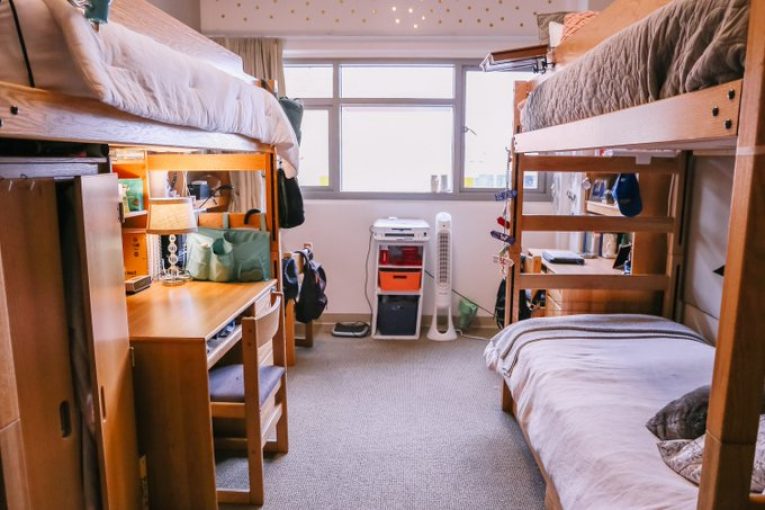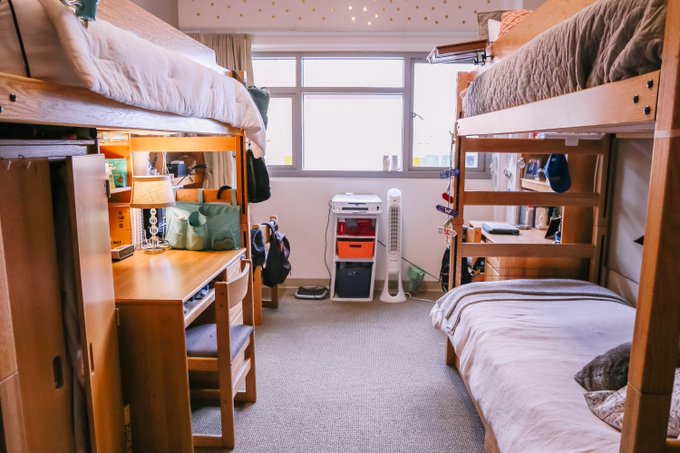

By Meghan Imperio
LOS ANGELES – Due to the COVID-19 pandemic, colleges and universities across the country have been closed, shifting to remote learning and forcing students and teachers to convert to a remote, online instruction format.
For the past four quarters, UCLA has shifted to remote learning to mitigate the spread of the coronavirus and largely closed housing for the current academic year, with a few exceptions for students who were in serious need of housing.
The limited housing and on-campus activities prompted UCLA to promise their new incoming first-year students and first-year transfer students UCLA Housing in the next academic year, hoping to make up for their non-traditional first year experience that they expected to get, and in hopes that campus would be able to reopen at a greater capacity.
In March 2021, UCLA Administration and Housing announced their plans for the upcoming academic year, anticipating that universities would be able to reopen and allow students back to in-person classes and on-campus housing.
Incoming first-year students, incoming transfer students and rising sophomores, were promised priority housing. Priority would also be given to students with an institutional need, beginning with athletes, and including former or current foster youth and veterans.
Despite promising returning transfer students that their one-year housing guarantee would be honored in the upcoming academic school year since many were unable to receive the first year experience they were guaranteed upon admission, these students were left out of the list of students that would be prioritized. 
Additionally, low-income students would not be given a housing priority and were encouraged to find off-campus housing accommodations which they likely would not be able to afford, especially considering the high cost of living in Westwood and the areas surrounding UCLA.
This decision sparked campus-wide conversations about the institutional and historical treatment of transfers at colleges and universities, with transfer students, representatives and allies voicing their concerns that transfers had once again been overlooked in the recent decision.
Not only was there initially a lack of transfer representation in the committee which made the housing priority decision, but they were left out of the priority decision despite being guaranteed otherwise months before.
Criticism of this decision noted the hypocrisy of the rhetoric used by the administration when justifying why rising sophomores received a housing priority while returning transfers did not, despite both groups being promised housing when they were able to return to campus, because they acknowledged that returning sophomores missed out on the first-year experience, but failed to recognize that transfers also did not share this experience.
However, the campus-wide support for transfers appears to have encouraged the administration to revise their initial plan for housing in the coming academic year as they plan for the majority of in-person activities to resume in the fall.
On Monday, May 17th, UCLA students, faculty, and staff received an update which laid out the changes in plans to reopen according to recommendations and the easing of restrictions from the Los Angeles County Department of Public Health as cases in the county continue to decrease and the city enters the yellow tier, the tier with the lowest amount of covid-related restrictions.
The announcement began by acknowledging students who had been overlooked in the previous decision.
The announcement stated: “We know that, for many UCLA students, living on campus is an important part of the college experience. Our inability to open fully our residence halls and university apartments since winter 2020 has caused many students, from first-years to transfers, to miss out on the opportunity to call UCLA home.
“We also know that, at points throughout our fall planning, not every student saw themself as fully included in our plans to reopen UCLA housing. Please know that all of our students’ varied and diverse experiences are valued by and important to us.”
The university also announced that with the decreasing pandemic-related restrictions and increasing number of individuals who are fully vaccinated with the COVID-19 vaccination, UCLA Housing expects to be able to offer triple-occupancy rooms, and therefore is able to provide a higher percentage of individuals on-campus housing.
The announcement goes on to describe that the increase in occupancy would allow them to offer dorms to foster youth, veterans, and incoming freshmen and transfers as well as more second-year students than they expected, including second-year transfer students.
In addition to the increased housing capacity, the announcement describes the hope that 80% of the classes offered at the university will be in-person in some capacity, with large lectures likely being held remotely and small discussions being held in-person.
However, for those who will be unable to find housing or commute to school in the coming school year, the announcement promises that there will still be a number of remote classes to choose from, but they ultimately expect that each student will be able to attend some type of in-person instruction.
Despite the promising email indicating a return back to almost the same campus that students experienced before the pandemic, the announcement also cautions the students, faculty, and staff that these conditions will continue to adapt as the pandemic does, including once again reducing the capacity of on-campus housing and limiting on-campus, in-person activities.
Meghan Imperio is a writer for the LA Vanguard’s social justice desk. She is an English major at UCLA, originally from Glendale, CA.
To sign up for our new newsletter – Everyday Injustice – https://tinyurl.com/yyultcf9
Support our work – to become a sustaining at $5 – $10- $25 per month hit the link: